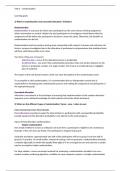Randomization - Study guides, Class notes & Summaries
Looking for the best study guides, study notes and summaries about Randomization? On this page you'll find 1547 study documents about Randomization.
Page 3 out of 1.547 results
Sort by
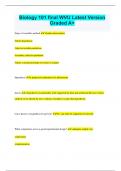
-
Biology 101 final WVU Latest Version Graded A+
- Exam (elaborations) • 46 pages • 2024
-
Available in package deal
-
- $11.99
- + learn more
Biology 101 final WVU Latest Version Graded A+ Steps of scientific method 1)make observations 2)form hypothesis 3)devise testable prediction 4)conduct critical experiment 5)draw conclusions/make revisions if needed Hypothesis a proposed explanation for phenomena theory a hypothesis exceptionally well supported by data and withstood the test of time, unlikely to be altered by new evidence, broader in scope than hypothesis Can a theory or hypothesis be proven? No, can only be s...
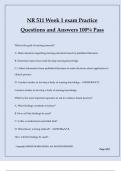
-
NR 511 Week 1 exam Practice Questions and Answers 100% Pass
- Exam (elaborations) • 18 pages • 2024
-
- $12.49
- + learn more
NR 511 Week 1 exam Practice Questions and Answers 100% Pass What is the goal of nursing research? A. Make decisions regarding nursing education based on published literature B. Determine topics that could develop nursing knowledge C. Gather information from published literature to make decisions about application to clinical practice D. Conduct studies to develop a body of nursing knowledge - ANSWER-D. Conduct studies to develop a body of nursing knowledge Which is the most important qu...
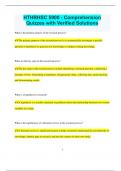
-
HTHRHSC 5900 - Comprehension Quizzes with Verified Solutions
- Exam (elaborations) • 12 pages • 2024
-
Available in package deal
-
- $9.99
- + learn more
HTHRHSC 5900 - Comprehension Quizzes with Verified Solutions What is the primary purpose of the research process? The primary purpose of the research process is to systematically investigate a specific question or hypothesis to generate new knowledge or validate existing knowledge. What are the key steps in the research process? The key steps in the research process include identifying a research question, conducting a literature review, formulating a hypothesis, designing the study, ...
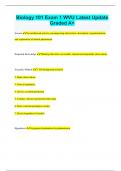
-
Biology 101 Exam 1 WVU Latest Update Graded A+
- Exam (elaborations) • 21 pages • 2024
-
Available in package deal
-
- $9.99
- + learn more
Biology 101 Exam 1 WVU Latest Update Graded A+ Science An intellectual activity, encompassing observation, description, experimentation, and explanation of natural phenomena Empirical Knowledge Thinking that relies on testable, rational and repeatable observations Scientific Method 1. Do background research 2. Make observations 3. Form a hypothesis 4. Devise a testable prediction 5. Conduct critical experiment/collect data 6. Draw conclusions/analyze results 7. Revise hypothes...
Answers to learning goals
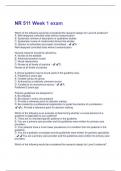
-
NR 511 Week 1 exam (Questions + Answers) Solved
- Exam (elaborations) • 9 pages • 2024
- Available in package deal
-
- $8.39
- + learn more
Which of the following would be considered the research design for Level III evidence? A. Well-designed controlled trials without randomization B. Systematic reviews of descriptive or qualitative studies C. Systematic review of randomized clinical trial studies D. Opinion of authorities and expert committees - ️️A. Well-designed controlled trials without randomization Nursing research should be utilized by: A. Nurses at the bedside B. Advanced practice nurses C. Nurse researchers D...
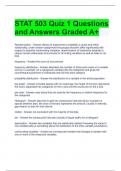
-
STAT 503 Quiz 1 Questions and Answers Graded A+
- Exam (elaborations) • 5 pages • 2024
-
- $12.49
- + learn more
STAT 503 Quiz 1 Questions and Answers Graded A+ Randomization - Answer-allows an experiment to establish a cause-and-effect relationship; under random assignment the groups shouldn't differ significantly with respect to potential confounding variables; randomization of treatments establish a clearer causal relationship and controls for all lurking variables as well as helps to rid bias frequency - Answer-the count of occurrences frequency distribution - Answer-describes the number of tim...
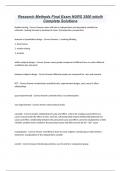
-
Research Methods Final Exam NURS 3500 with Complete Solutions
- Exam (elaborations) • 24 pages • 2024
- Available in package deal
-
- $10.99
- + learn more
Research Methods Final Exam NURS 3500 with Complete Solutions Relative timing - Correct Answer when will info on independent and dependent variables be collected - looking forward or backward in time? (retrospective, prospective) features of quantitative design - Correct Answer 1. masking/blinding 2. time frames 3. relative timing 4. location within-subjects design - Correct Answer same people compared at different time or under different conditions (pre and post) between-subjects d...
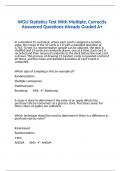
-
WGU Statistics Test With Multiple, Correctly Answered Questions Already Graded A+
- Exam (elaborations) • 35 pages • 2024
- Available in package deal
-
- $12.09
- + learn more
WGU Statistics Test With Multiple, Correctly Answered Questions Already Graded A+ In a standard 52-card deck, where each card is assigned a numeric value, the mean of the 52 cards is 7.0 with a standard deviation of 3.742. To test if a representative sample can be attained, the deck is shuffled and 13 cards are randomly drawn, one at a time. Each card is recorded and then returned randomly to the deck before the next card is drawn. This process of drawing 13 random cards is repeated a total o...
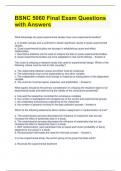
-
BSNC 5060 Final Exam Questions with Answers
- Exam (elaborations) • 7 pages • 2024
-
- $12.79
- + learn more
BSNC 5060 Final Exam Questions with Answers What advantage do quasi-experimental studies have over experimental studies? a. A smaller sample size is sufficient to obtain significant results in quasi-experimental studies. b. Quasi-experimental studies are stronger in establishing cause-and-effect relationships. c. Descriptive statistics can be used to analyze the data in quasi-experimental studies. d. Quasi-experimental studies are more adaptable to real-world settings. - Answer-d. Th...

How much did you already spend on Stuvia? Imagine there are plenty more of you out there paying for study notes, but this time YOU are the seller. Ka-ching! Discover all about earning on Stuvia

